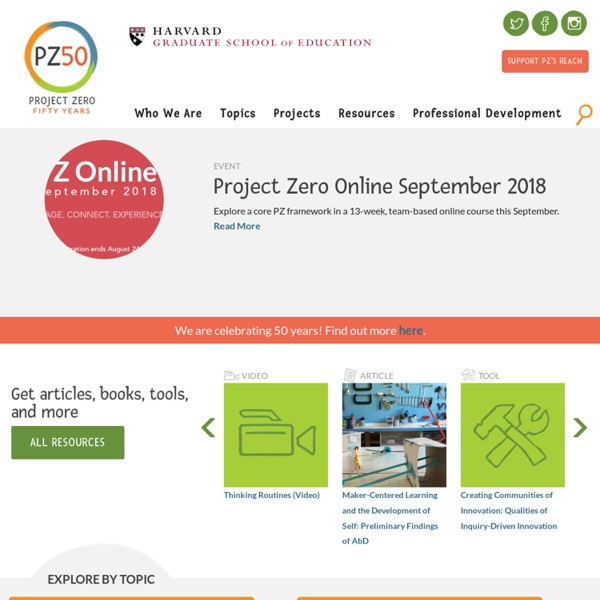



http://www.pz.harvard.edu/homepage
Related: Critical Thinking • fortbildning skola • Professional developmentHow to Prepare Social Studies Students to Think Critically in the Modern World “The consequence of this approach, coupled with a preference by many schools for multiple-choice assessments, turns out students who are disillusioned with social studies—and creates an environment where “accumulating knowledge and memorizing information is emphasized because that’s what counts on standardized tests,” writes Franz. In his book Why Learn History (When It’s Already on Your Phone), author Sam Wineburg, a professor at Stanford’s Graduate School of Education, examines how historians approach resources and argues that this is how teachers should be rigorously vetting—and teaching students to vet—social studies materials for the classroom. Wineburg first describes how an AP US History student analyzes a New York Times article from 1892 about the creation of Discovery Day, later renamed Columbus Day. The student criticizes the article for celebrating Columbus as a noble hero when, in fact, he “captured and tortured Indians.”
Courses Teacher professional development for the digital age European Schoolnet has organised fee-based courses in its own training venue since 2012. Future Classroom Lab is a unique and inspiring learning environment in Brussels, that challenges visitors to rethink the role of pedagogy, technology and design in their classrooms. The training opportunities include from 2 to 5-day workshops and courses to address today's teaching challenges and the classrooms of the future. See our course offer below. Rosemary Hipkins Print Rosemary Hipkins presented this session at the CORE Breakfast seminar in Dunedin, March 29 2011. The session: sketched the overall shape of curriculum change in CIES schools described typical professional learning actions and decisions in these schools outlined the early benefits of curriculum change in response to the NZC signaled emergent challenges and possible future directions for ongoing change suggested resources that could help achieve next steps towards building a 21st century curriculum in New Zealand schools.
Resources: Collective Impact The Alliance has operated on the foundational premise that no one individual or group acting in isolation can solve the complex systemic problems in public education. In the decade since it began, the Alliance has been progressing in an intentional arc from partnerships, to collaborations, to networks of influence, towards where we are now: creating a vision and structure for collective impact. These are thinkers and articles who have contributed to shaping our vision and actions. The Alliance for Arts Learning Leadership is currently engaged in Mapping the Next 10 Years.
8 Critical Learning Reflections That Promote Deeper Thinking – Wabisabi Learning The use of learning reflections in a classroom is a powerful practice for any modern learner. Students are usually frank and honest in their assessment of their own performance and that of their peers. Encouraging learner reflections and self-assessment practices can add a powerful dimension to learning in any classroom. Reflecting on the day’s learning activities allows your learners to: Consider their actions and choicesReflect on decisionsReview and process new knowledgeIncorporate teacher feedbackSolidify important conceptsDecide their future learning pathways We're going to take a look at eight learner reflections featured by Terry Heick in the TeachThought article 8 Reflective Questions To Help Any Student Think About Their Learning, and expand on them a little bit.
Pilgrims English Language Courses - 2021 University of Limerick Update Dear Teachers, As we write, Ireland has still a tight quarantine protocol in force and it is unclear when this is lifted. Under such circumstances, it would be very difficult for the University of Limerick to operate and host us on their campus, so regrettably, we are having to cancel our summer programme. 46 Tools To Make Infographics In The Classroom Infographics are interesting–a mash of (hopefully) easily-consumed visuals (so, symbols, shapes, and images) and added relevant character-based data (so, numbers, words, and brief sentences). The learning application for them is clear, with many academic standards–including the Common Core standards–requiring teachers to use a variety of media forms, charts, and other data for both information reading as well as general fluency. It’s curious they haven’t really “caught on” in schools considering how well they bridge both the old-form textbook habit of cramming tons of information into a small space, while also neatly overlapping with the dynamic and digital world. So if you want to try to make infographics–or better yet have students make them–where do you start?
Bay Area Performance Assessment Network If you would like your school to be considered for the second cohort, please download the application. Download Application Noam Chomsky on the Dangers of Standardized Testing “The assessment itself is completely artificial. It’s not ranking teachers in accordance with their ability to help develop children who will reach their potential, explore their creative interests. Those things you’re not testing.. it’s a rank that’s mostly meaningless. And the very ranking itself is harmful. It’s turning us into individuals who devote our lives to achieving a rank.
How can you change from a fixed mindset to a growth mindset? Step1. Learn to hear your fixed mindset “voice.” As you approach a challenge, that voice might say to you “Are you sure you can do it? Maybe you don’t have the talent.” “What if you fail—you’ll be a failure” “People will laugh at you for thinking you had talent.” “If you don’t try, you can protect yourself and keep your dignity.” June 2021 - Home Editorial Pilgrims News Interview with Chaz Pugliese, Director of Education at Pilgrims Various Articles - Teaching English in COVID times Various Articles - Drama in action No Dentist Left Behind I got this email today at school, thought I'd share. No Dentist Left Behind My dentist is great! He sends me reminders so I don't forget
Página principal del grupo de investigación al que pertenece David Perkins. by barbisotti Sep 20